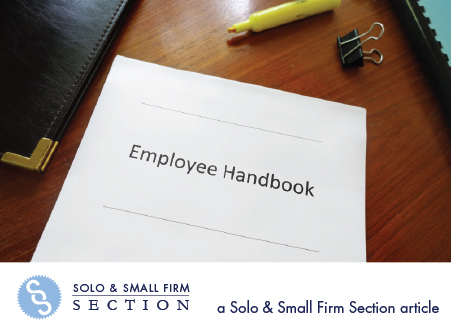As a business owner, there is much to keep on top of. Insurance, office space, technology, cash flow, not necessarily in that order.
That doesn’t take into account the actual work of being a lawyer. While you’re busy navigating legal issues for your clients, it’s easy to back burner your own legal issues, such as your firm’s employment policies. But that simmering pot is not one that you want to be in when the Department of Fair Employment and Housing (DFEH) comes calling. Did you know that if you have five or more employees, you are required to have certain policies in writing?
The DFEH passed regulations that took effect in April which expand the requirements for policies employers must have in writing. Thus, this is a good time to evaluate whether your written employment policies are up to date. (Note: other key amendments, including those related to pregnancy disability leave, sexual harassment training, record keeping, and who is protected, are beyond the scope of this article.)
The requirement for employers to disseminate a written sexual harassment policy has been around since 1992. As a result, most standard employee handbooks have a thorough section about the employer’s policy for prevention of sexual harassment that mentions nothing at all about discrimination or retaliation. That has always been a pet peeve of mine, because claims related to these issues often go hand in hand. Now the DFEH has mandated that employers must have in writing a policy that also covers discrimination and retaliation prevention.
The written policy must:
- List all protected categories;
- State that the law covers conduct by coworkers and third parties, as well as supervisors and managers
- Create a complaint process that includes specified elements
- Include the option for an employee to complain to: someone within the company aside from the employee’s immediate supervisor; a complaint hotline; an ombudsperson, and/or the DFEH and the Equal Employment Opportunity Commission
- Instruct supervisors that they are required to report any complaint they receive
- State that the employer will conduct a fair, timely, and thorough investigation when it receives a complaint
- State that the investigation will be kept confidential to the extent possible
- State that the employer will take remedial actions if it determines there was misconduct
- State that employees may not be retaliated against for complaining or participating in an investigation
The policy must be disseminated to employees in one or more of five specific ways. It must also be translated into any language other than English that 10 percent or more of the workforce speaks.
 Having a policy in place is valuable if an employer doesn’t simply look at it as a box to check off that can be ignored once it’s completed. The policy provides a framework for promoting a fair and respectful work environment. It also will be the foundation of an employer’s defense when faced with a complaint. To satisfy both of these objectives, it is important that the policy is consistently followed.
Having a policy in place is valuable if an employer doesn’t simply look at it as a box to check off that can be ignored once it’s completed. The policy provides a framework for promoting a fair and respectful work environment. It also will be the foundation of an employer’s defense when faced with a complaint. To satisfy both of these objectives, it is important that the policy is consistently followed.
About the author:
Rose-Ellen Fairgrieve is the owner of Fairgrieve Law Office. She advises and defends employers in employment law matters. She serves on the executive committee of BASF’s Solo and Small Firm section, the board of the West Portal Merchants Association, and coaches youth basketball.


